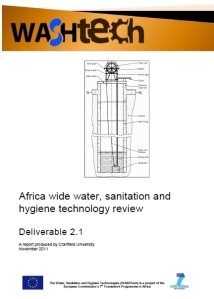 The WASHTech project has published a literature review focusing on 14 technologies used in Africa in the water, sanitation and hygiene (WASH) sector.
The WASHTech project has published a literature review focusing on 14 technologies used in Africa in the water, sanitation and hygiene (WASH) sector.
The following sanitation and hygiene technologies are included in the review:
- Bio-additives to pit latrines
- VIP latrines
- Urine diversion dry toilets
- Gulper
- Tippy tap
For each technology there is a description of the range of literature available on it, a concise description of the technology itself, a description of its application, a selection of interesting case studies, and an explanation as to whether the technology meets technical, financial, social and institutional success criteria.
Only two technologies met all four success criteria: hand dug wells and the India Mark II pump, and the latter only with the caveat that there was a functional maintenance system.
The least successful technology was the Playpump, which was only institutionally successful, and even that was only after significant pressure was put on governments by non-conventional donors. Jerry cans and the gulper only met one success criteria (technical success); they may meet other success criteria but further research is required. Most technologies were technically successful – the only failures were bio-additives and Playpumps. The other success criteria were met by roughly half of the technologies.
Core issues that WASHTech plans to take up further include the appeal of inappropriate technologies like Playpumps and Lifestraws to naive donors, and ways to get government approval for low-cost, locally managed technologies.
Full reference:
Parker, A. et al., 2011. Africa wide water, sanitation and hygiene technology review. (WASHTech Deliverable 2.1). The Hague: WASHTech c/o IRC International Water and Sanitation Centre and Cranfield: Cranfield University. 93 p. : 1 box, 9 fig., 1 tab. Includes references.
Available at: http://wp.me/a1szDW-1o
The WASHTech project (2011-2013) is involving local partners in Burkina Faso, Ghana and Uganda to introduce a robust Technology Assessment Framework (TAF) that will assess the potential of new innovative technologies which may be used at decentralised level.
The partners involved in WASHTech are:
- Centre Régional pour l’Eau Potable et l’Assainissement à faible coût (CREPA) in Burkina Faso
- Network for Water and Sanitation (NETWAS), Uganda
- Training, Research and Networking for Development (TREND), Ghana
- Kwame Nkrumah University of Science and Technology (KNUST), Ghana
- WaterAid in Ghana, Uganda and Burkina Faso.
European partners include IRC in The Netherlands (coordinating the project), SKAT Foundation in Switzerland, Cranfield University and WaterAid in the United Kingdom.
The WASHTech project is co-funded under the 7th Framework Programme of the European Commission’s Africa research programme.
For more information go to washtechafrica.wordpress.com
